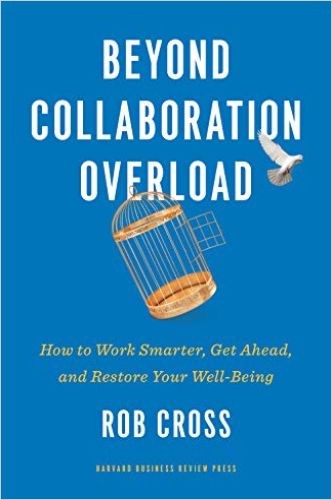Professor Rob Cross shows you how to shrink your commitments, collaborate less and build smaller, stronger networks to create a more balanced and productive working life.

Too Much of a Good Thing
After dozens of award-winning articles and books on network dynamics, Professor of Global Leadership Rob Cross is throwing up a caution sign: Too much networking can lead to collaboration overload. Those most affected – often a firm’s stars – suffer stress and reduced productivity. They frequently leave their organizations. Widely considered among the world’s foremost experts in his field, Cross’ timely contribution has earned multiple accolades, including Best Management Book of 2021 by strategy+business.
When a good thing goes bad
Cross believes in collaboration. He has spent a career uncovering its benefits. Yet, he points out that nearly everything – from answering emails and texts, attending webinars, sitting in meetings, or even working alone on projects – requires collaboration. Leaders and pundits encourage it. They knock out walls in offices and license corporate social platforms to facilitate it. They almost never question it. After all, collaboration can spark innovation, drive collegiality, and even improve peoples’ physical and mental health.
Overloaded people become gradually trapped and unable to engage with others in the most productive ways. Rob Cross
But Cross believes it has gone too far. He points to the increasingly high stress levels reported by workers, and other mental health issues, including burnout. He estimates that 85% of a typical employee’s time is now spent in collaboration – much of it unnecessarily. Whether in useless meetings or needless conference calls, the time you waste in unproductive collaboration takes away from your ability to reflect, plan and think, and it depletes your energy, purpose and structure.
Excise unproductive interactions
Cross advises you to recognize and excise unnecessary collaboration. Consider the wide control you have over your work, perhaps greater now than ever. Use it to take matters into your own hands. Cross points out that no one cares much when you decline meetings you have little or no role in; when you leave at 6pm instead of 9pm, or when you wait until the morning to answer emails.
Use the time you save to generate energy and enthusiasm you can use to spark engagement in others. These strategies drive consistent and sustainable high-performance and contribute to your health and well-being.
People who create energy or enthusiasm in networks are far more likely to become and remain high performers as well as to move more fluidly in and out of groups. Rob Cross
Cross advises you to structure your days by seeking out productive collaborations; to carefully craft smaller, stronger networks of diverse people and expertise. These closer connections give you resources to tap as you need help or advice in assignments, projects and jobs.
Delegate and build trust
Cross suggests you equip your reports with the tools they need and invest the time necessary to coach and develop them. Delegate, even where you could do the work better and faster.
Essential collaboration isn’t just something nice to have. It’s a must-have. Companies’ performance and very survival depend on it. Rob Cross
When you collaborate, take the opportunity to build trust. Ask questions, invite others to speak and listen. When you feel like you’ve had too much interaction, pull back – for yourself and those you lead. Distinguish between essential and non-essential collaboration.
Just say “no”
You may feel that agreeing to every project, assignment and request for help signals your willingness to do whatever it takes, but you’ll wind up doing things poorly. Cross says “no” to always saying “yes.”
For decades, Cross’s research has demonstrated that those inclined to help their colleagues usually turn out to be among a firm’s highest performers. But giving indiscriminately leads to overload and diminished value. When people ask for your help, Cross urges you to ask which specific elements you can weigh in on. He suggests that you collaborate where you can have the greatest positive impact, but mostly in work that also connects to your goals and priorities.
Beware the slow boil
You might think that any single request or project won’t matter much to your workload. But most people don’t get overwhelmed overnight. Cross warns that it occurs insidiously, bit by bit, as you take on more, make yourself more central, and suffer the consequent flood of meetings, emails, calls and interruptions. At some stage, says Cross, you’ll reach a breaking point. You might burn out or make a career-damaging mistake – and/or lose your best people because, by having your hand in everything, you frustrate their need for autonomy and growth.
Choose meaningful work
Your interests signal where you should orient your time. Let your values and identity guide you too. Cross suggests that you reflect on those times you worked most effortlessly, when you were “in the zone.” Know your strengths, interests and goals, then block time to pursue them. Work on your priorities during your most productive hours.
Well-being is clearly tied to a sense of purpose – in essence, a belief that life is meaningful and serves aims higher than yourself. Rob Cross
By aligning your work with your interests, Cross says you gain energy, which attracts the people you need to succeed. He advises you to resist work imposed on you by others, whether from requests, incessant emails or otherwise, and to let people know when and how you prefer to collaborate. Choose your work. Build trust by speaking your truth and sharing information. Make your and your team’s goals known so that people understand your priorities.
Harness your social network
Cross doesn’t want you to hide away in isolation. Without exception, he says, all high performers rely on their network. They tap it early on in projects to gain knowledge, perspective and feedback before launching too far down any particular path.
Cross urges you to network deliberately with people who can help you achieve your goals. But give first. Offer ideas and recognition of others’ work before you ask for help. Look for a range of experts and keep them close. When you marry your social network with the activities you want to pursue for your well-being, you create accountabilities and dependencies that will keep you on track when work and other pressures mount.
Cross’ latest book on social networks could not have come at a better time, as businesses navigate the “new normal” of post-pandemic work. His insights are deeply grounded in two decades of meticulous academic research and peer-reviewed publications.
Other noteworthy books on collaboration include, Reimagining Collaboration: Slack, Microsoft Teams, Zoom, and the Post-COVID World of Work by Phil Simon and Mastering Collaboration: Make Working Together Less Painful and More Productive by Gretchen Anderson.














